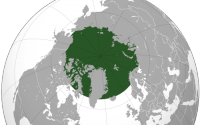Race Is On as Ice Melt Reveals Arctic Treasures

With Arctic ice melting at record pace, the world’s superpowers are increasingly jockeying for political influence and economic position in outposts like this one, previously regarded as barren wastelands.
Quicktabs: News
Chinese activity in the Arctic to some extent mirrors that of other non-Arctic countries, as the region warms.
The European Union, Japan and South Korea have also applied in the last three years for permanent observer status at the Arctic Council, which would allow them to present their perspective, but not vote.
This once-obscure body, previously focused on issues like monitoring Arctic animal populations, now has more substantive tasks, like defining future port fees and negotiating agreements on oil spill remediation. “We’ve changed from a forum to a decision-making body,” said Gustaf Lind, Arctic ambassador from Sweden and the council’s current chairman.
Even so, Arctic nations and NATO are building up military capabilities in the region, as a precaution. That has left China with little choice but to garner influence through a strategy that has worked well in Africa and Latin America: investing and joining with local companies and financing good works to earn good will. Its scientists have become pillars of multinational Arctic research, and their icebreaker has been used in joint expeditions. And Chinese companies, some with close government ties, are investing heavily across the Arctic. In Canada, Chinese firms have acquired interests in two oil companies that could afford them access to Arctic drilling. During a June visit to Iceland, Premier Wen Jiabao of China signed a number of economic agreements, covering areas like geothermal energy and free trade. In Greenland, large Chinese companies are financing the development of mines that are being developed around discoveries of gems or minerals by small prospecting companies, said Soren Meisling, head of the China desk at the Bech Bruun law firm in Copenhagen, which represents many of them. A huge iron ore mine under development near Nuuk, for example, is owned by a British company but financed in part by a Chinese steel maker. Chinese mining companies have proved adept at working in challenging locales and have even proposed building runways for jumbo jets on the ice in Greenland’s far north to fly out minerals until the ice melts enough for shipping. “There is already a sense of competition in the Arctic, and they think they can have first advantage,” said Jingjing Su, a lawyer in Bech Bruun’s China practice.
